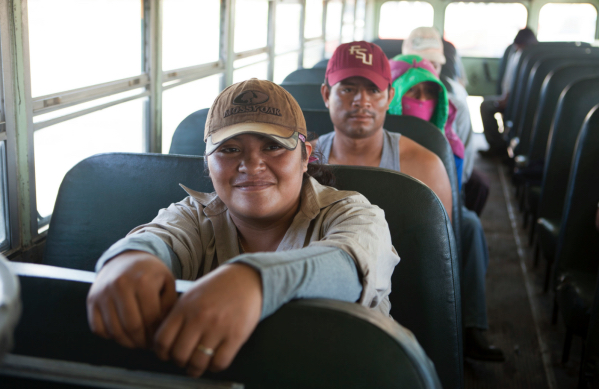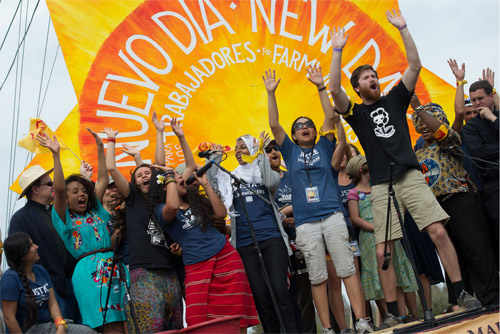
Sanjay Rawal, director of “Food Chains,” in letter to editor of NYT: “The problem is real. But so is the solution — and it deserves mention.”
Earlier this month, the New York Times published a hard-hitting op/ed by two longtime California-based farmworker rights activists, Jose Padilla of California Rural Legal Assistance and David Bacon, an independent author and photojournalist. The piece, entitled “Protect Female Farmworkers,” took an unblinking look at the problem of sexual harassment and assault of female farmworkers in the US agricultural industry, cataloged the obstacles to remedy for women who have suffered sexual violence and sought justice, and suggested a possible structural solution in immigration reform. Here’s an excerpt:
… But perhaps the biggest impediment to fighting harassment in the fields is America’s immigration policy itself. Federal regulations forbid legal aid organizations like California Rural Legal Assistance from directly representing undocumented people, and the illegal nature of their work situations makes it difficult for them to come forward. Finding a path toward documentation and legal employment for these women would also empower them to report those who rape and harass them.
Last year, California Rural Legal Assistance settled a $1.3 million case for a farmworker who was assaulted in a raspberry field, and then sent back to work in her bloody and ripped clothes. “It’s the saddest thing that has happened to me in my life — for me it’s like a wound that’s there,” our client said during the sentencing phase of the case. “I just don’t know how I’ll be able to get out of this trauma.” read more
It was a powerful piece that is definitely worth a read, if you haven’t had a chance to read it yet.
But for many readers, Padilla and Bacon’s analysis of female farmworkers’ rights and the fight against sexual violence in the fields today lacked one essential element, one that offers both concrete proof of victory over abuse and a model that can be expanded to fields where women work in often unimaginably harsh conditions from the East Coast to the West and beyond. Perhaps because of their California roots, the authors failed to include mention of the CIW’s Fair Food Program, which, by leveraging the market power of some of the world’s largest retail food brands for enforcement muscle, has eliminated sexual violence in Florida’s fields and expanded those gains to many of the biggest tomato operations in six states along the East Coast this past summer. That success prompted PBS to highlight the FFP as “unique in the country” for its effectiveness against sexual violence in its 2013 documentary “Rape in the Fields.”

And so, this being the New York Times with perhaps the most informed readership in the country, several readers took it upon themselves to fill the hole in the op/ed piece and write letters to the editor about the Fair Food Program and its unique success. While many of those letters made their way to the CIW office, one made it all the way into the print edition of Saturday’s New York Times. We are including that letter, by “Food Chains” director Sanjay Rawal, in its entirety here:
To the Editor:
Re “Protect Female Farmworkers,” by José R. Padilla and David Bacon (Op-Ed, Jan. 19):
Female farmworkers refer to the fields as the “green motel” for the prevalence of sexual violence in agriculture. We explored that issue in my documentary “Food Chains.” What the Op-Ed essay did not mention is that a group of farmworkers, working with their employers, has in fact stopped sexual violence in one of our largest agricultural sectors, the Florida tomato industry.
The Coalition of Immokalee Workers, the subjects of my film, has achieved these successes by forcing the large buyers of produce — supermarket and fast food conglomerates — to enforce a zero-tolerance policy for sexual violence and other human rights abuses in their supply chains.
This market-driven solution, the Fair Food Program, has been lauded by the White House Advisory Council on Faith-Based and Neighborhood Initiatives, the United Nations Working Group on Business and Human Rights, and former President Bill Clinton.
The problem is real. But so is the solution — and it deserves mention.
SANJAY RAWAL
Did you write a letter or a comment to the Times following the op/ed by Padilla and Bacon? If so, send it our way and we might just compile them for a post in the days ahead.
